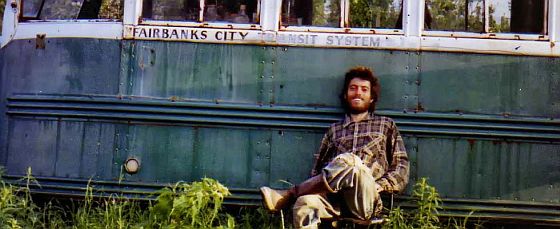
Jon Krakauer writes: Twenty-one years ago this month, on September 6, 1992, the decomposed body of Christopher McCandless was discovered by moose hunters just outside the northern boundary of Denali National Park. He had died inside a rusting bus that served as a makeshift shelter for trappers, dog mushers, and other backcountry visitors. Taped to the door was a note scrawled on a page torn from a novel by Nikolai Gogol:
ATTENTION POSSIBLE VISITORS.
S.O.S.
I NEED YOUR HELP. I AM INJURED, NEAR DEATH, AND TOO WEAK TO HIKE OUT OF HERE. I AM ALL ALONE, THIS IS NO JOKE. IN THE NAME OF GOD, PLEASE REMAIN TO SAVE ME. I AM OUT COLLECTING BERRIES CLOSE BY AND SHALL RETURN THIS EVENING. THANK YOU,
CHRIS McCANDLESS
AUGUST ?From a cryptic diary found among his possessions, it appeared that McCandless had been dead for nineteen days. A driver’s license issued eight months before he perished indicated that he was twenty-four years old and weighed a hundred and forty pounds. After his body was flown out of the wilderness, an autopsy determined that it weighed sixty-seven pounds and lacked discernible subcutaneous fat. The probable cause of death, according to the coroner’s report, was starvation.
In “Into the Wild,” the book I wrote about McCandless’s brief, confounding life, I came to a different conclusion. I speculated that he had inadvertently poisoned himself by eating seeds from a plant commonly called wild potato, known to botanists as Hedysarum alpinum. According to my hypothesis, a toxic alkaloid in the seeds weakened McCandless to such a degree that it became impossible for him to hike out to the highway or hunt effectively, leading to starvation. Because Hedysarum alpinum is described as a nontoxic species in both the scientific literature and in popular books about edible plants, my conjecture was met with no small amount of derision, especially in Alaska.
I’ve received thousands of letters from people who admire McCandless for his rejection of conformity and materialism in order to discover what was authentic and what was not, to test himself, to experience the raw throb of life without a safety net. But I’ve also received plenty of mail from people who think he was an idiot who came to grief because he was arrogant, woefully unprepared, mentally unbalanced, and possibly suicidal. Most of these detractors believe my book glorifies a senseless death. As the columnist Craig Medred wrote in the Anchorage Daily News in 2007,
“Into the Wild” is a misrepresentation, a sham, a fraud. There, I’ve finally said what somebody has needed to say for a long time …. Krakauer took a poor misfortunate prone to paranoia, someone who left a note talking about his desire to kill the “false being within,” someone who managed to starve to death in a deserted bus not far off the George Parks Highway, and made the guy into a celebrity. Why the author did that should be obvious. He wanted to write a story that would sell.
The debate over why McCandless perished, and the related question of whether he is worthy of admiration, has been smoldering, and occasionally flaring, for more than two decades now. But last December, a writer named Ronald Hamilton posted a paper on the Internet that brings fascinating new facts to the discussion. Hamilton, it turns out, has discovered hitherto unknown evidence that appears to close the book on the cause of McCandless’s death. [Continue reading…]

